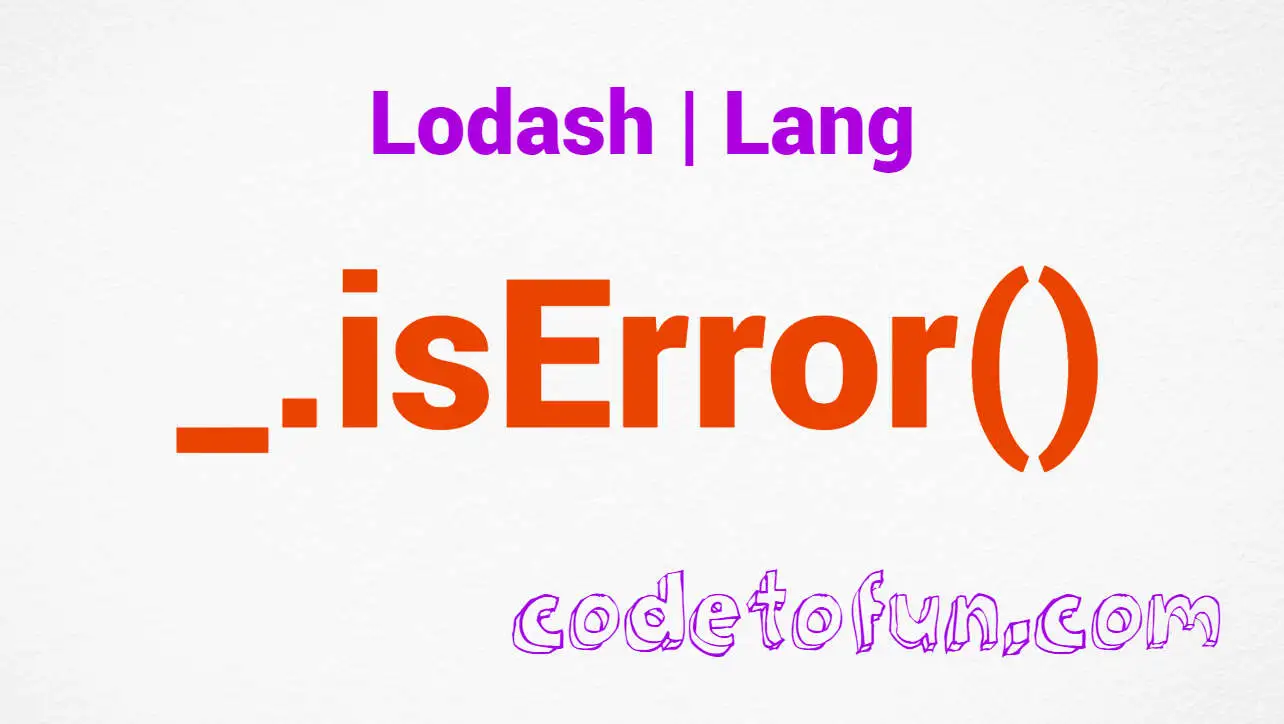
Lodash Home
- Lodash Intro
- Lodash Array
- Lodash Collection
- Lodash Date
- Lodash Function
- Lodash Lang
- _.castArray
- _.clone
- _.cloneDeep
- _.cloneDeepWith
- _.cloneWith
- _.conformsTo
- _.eq
- _.gt
- _.gte
- _.isArguments
- _.isArray
- _.isArrayBuffer
- _.isArrayLike
- _.isArrayLikeObject
- _.isBoolean
- _.isBuffer
- _.isDate
- _.isElement
- _.isEmpty
- _.isEqual
- _.isEqualWith
- _.isError
- _.isFinite
- _.isFunction
- _.isInteger
- _.isLength
- _.isMap
- _.isMatch
- _.isMatchWith
- _.isNaN
- _.isNative
- _.isNil
- _.isNull
- _.isNumber
- _.isObject
- _.isObjectLike
- _.isPlainObject
- _.isRegExp
- _.isSafeInteger
- _.isSet
- _.isString
- _.isSymbol
- _.isTypedArray
- _.isUndefined
- _.isWeakMap
- _.isWeakSet
- _.lt
- _.lte
- _.toArray
- _.toFinite
- _.toInteger
- _.toLength
- _.toNumber
- _.toPlainObject
- _.toSafeInteger
- _.toString
- Lodash Math
- Lodash Number
- Lodash Object
- Lodash Seq
- Lodash String
- Lodash Util
- Lodash Properties
- Lodash Methods
Lodash _.isError() Lang Method

Photo Credit to CodeToFun
🙋 Introduction
In the landscape of JavaScript programming, handling errors is a critical aspect of writing robust and reliable code. Lodash, a versatile utility library, provides a range of functions to simplify common programming tasks. One such function is _.isError(), a method designed to identify whether a given value is an Error object.
This method proves invaluable for developers seeking to enhance error handling and streamline their debugging processes.
🧠 Understanding _.isError() Method
The _.isError() method in Lodash is straightforward yet powerful. It checks if a given value is an instance of the JavaScript Error object, which is commonly used to represent and propagate errors within applications.
💡 Syntax
The syntax for the _.isError() method is straightforward:
_.isError(value)- value: The value to check.
📝 Example
Let's dive into a simple example to illustrate the usage of the _.isError() method:
const _ = require('lodash');
const errorObject = new Error('This is an error message');
const isError = _.isError(errorObject);
console.log(isError);
// Output: trueIn this example, _.isError() verifies that errorObject is indeed an instance of the Error object, returning true.
🏆 Best Practices
When working with the _.isError() method, consider the following best practices:
Distinguishing Errors:
Use
_.isError()to distinguish between different types of values, especially when dealing with complex data structures. This can help prevent unintended consequences when handling errors in your application.example.jsCopiedconst potentialError = /* ...some value that may or may not be an error... */ ; if (_.isError(potentialError)) { // Handle as an error console.error('An error occurred:', potentialError.message); } else { // Continue processing the value console.log('No error, continue processing:', potentialError); }Custom Error Checking:
Combine
_.isError()with other conditionals to create custom error-checking logic. This is particularly useful when dealing with functions that may return various types of values.example.jsCopiedfunction customFunction() { // ...some logic that may or may not throw an error... } const result = customFunction(); if (_.isError(result)) { console.error('An error occurred:', result.message); } else { console.log('Function executed successfully:', result); }Enhanced Debugging:
Integrate
_.isError()into your debugging toolkit to quickly identify and handle errors during development and testing.example.jsCopiedtry { // ...some code that may throw an error... throw new Error('This is a simulated error'); } catch (error) { if (_.isError(error)) { console.error('Caught an error:', error.message); } }
📚 Use Cases
Error Handling:
The primary use case for
_.isError()is in error handling, allowing you to distinguish between regular values and instances of the Error object.example.jsCopiedfunction processUserData(userData) { if (!userData) { throw new Error('User data is required'); } // ...continue processing user data... } try { const userData = /* ...fetch user data... */ ; processUserData(userData); } catch (error) { if (_.isError(error)) { console.error('Error processing user data:', error.message); } }Validation:
Validate whether a given value is an error before proceeding with specific operations. This can be useful in scenarios where certain actions should only be taken in the presence of an error.
example.jsCopiedfunction performSpecialOperation(result) { if (_.isError(result)) { // Perform special operation for error case console.log('Special operation for error:', result.message); } else { // Continue with regular processing console.log('Regular processing:', result); } } const operationResult = /* ...some operation that may return an error... */ ; performSpecialOperation(operationResult);Error Logging:
Implement error logging mechanisms by using
_.isError()to identify and log errors during runtime.example.jsCopiedfunction logError(error) { if (_.isError(error)) { // Log the error details console.error('Error logged:', error.message); } } // ...somewhere in your code... try { // ...some operation that may throw an error... } catch (error) { logError(error); }
🎉 Conclusion
The _.isError() method in Lodash provides a simple yet effective way to determine whether a given value is an instance of the JavaScript Error object. Incorporating this method into your error-handling practices enhances code reliability and simplifies debugging processes. Whether you're validating inputs, handling errors, or implementing custom error logic, _.isError() proves to be a valuable tool in your JavaScript toolkit.
By adhering to best practices and exploring diverse use cases, you can harness the full potential of the _.isError() method in your Lodash projects.
👨💻 Join our Community:
Author

For over eight years, I worked as a full-stack web developer. Now, I have chosen my profession as a full-time blogger at codetofun.com.
Buy me a coffee to make codetofun.com free for everyone.
Buy me a CoffeeShare Your Findings to All
Recent Post in lodash


Lodash _.templateSettings.imports Property

Lodash _.templateSettings.evaluate Property

Lodash _.templateSettings Property

Lodash _.templateSettings.escape Property

Lodash _.templateSettings.interpolate Property








If you have any doubts regarding this article (Lodash _.isError() Lang Method), please comment here. I will help you immediately.